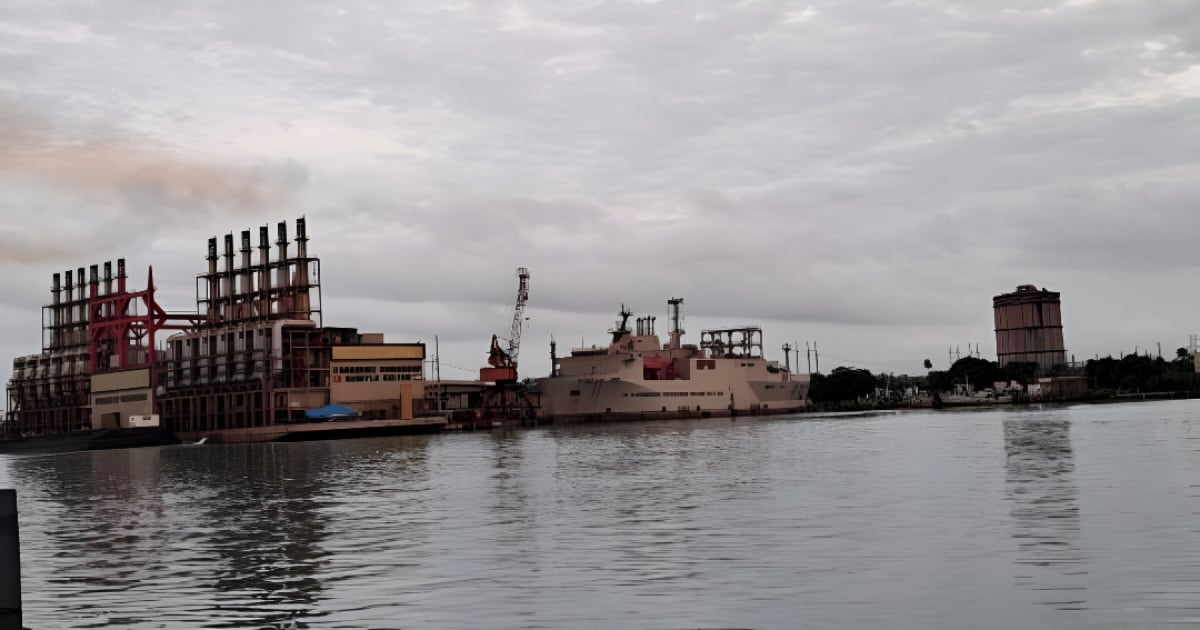The massive cargo ship OK, sailing under the Liberian flag, made its entrance into Havana this Wednesday, potentially signaling the imminent departure of the Turkish floating power plant, Suheyla Sultan. This vessel is one of only two remaining units of its kind still operational in Cuba. Independent outlet 14ymedio reported that the ship's arrival is intended to transport the power barge out of the country amidst a worsening energy crisis.
The Colossal Ship's Role in Cuba's Energy Crisis
Shortly after 9:00 a.m., the Havana port pilot set out to guide the OK, whose silhouette loomed on the horizon from the Malecón. By midday, the cargo ship had navigated past Havana's refinery and anchored near Regla, where the Suheyla Sultan is docked. The vessel embarked from Turkey on April 10, stopping in the Dutch Caribbean island of St. Eustatius before making a technical stop in the Dominican Republic, as tracked by maritime platform Vesselfinder.
Jorge Piñón, a specialist from the University of Texas, noted that the OK is specifically designed to transport heavy structures like floating power plants.
Implications of the Suheyla Sultan's Departure on Cuba's Power Grid
The potential exit of the Suheyla Sultan, which contributes 240 megawatts (MW) to the National Electric System (SEN), would be a severe blow to Cuba's already struggling energy network. This power plant, recognized for its 12 stacks and continuous emission of black smoke, has long provided much-needed relief to the capital's energy demands. Its departure is particularly concerning as it coincides with the summer months, a peak period for energy consumption.
Rising Blackouts Across Cuba
This Wednesday, the Cuban Electric Union reported a generation deficit of 1,495 MW, leading to prolonged and frequent blackouts nationwide. On May 28, the Havana Electric Company (EELH) announced emergency electricity cuts during nighttime hours to cope with the ongoing generation shortfall affecting the National Electric System. Service interruptions will affect areas of the capital for up to an hour overnight, targeting circuits not previously impacted by scheduled daytime and nighttime outages.
Reasons Behind the Potential Withdrawal of the Turkish Barge
The Cuban government has publicly acknowledged the "risk" of losing the power barges due to difficulties in meeting financial obligations with Karpowership, the Turkish company that owns these floating units. Additionally, other countries, such as Ecuador, are interested in contracting the Turkish company's services and may offer better financial terms.
While there is no official confirmation regarding the withdrawal of the second operational floating power plant, the Erol Bey, which provides 63 MW, Energy and Mines Minister Vicente de la O Levy previously indicated that the removal of these barges would occur "progressively."
From Eight Barges to Just Two
At its peak, Cuba hosted eight Turkish power barges generating approximately 770 MW, covering around a quarter of the country's electrical demand. However, financial woes, fuel supply issues, and the deterioration of energy infrastructure have led to the decommissioning or halting of most units. By December 2024, only two remained active in Havana Bay, located in Melones and Regla, with a combined capacity of 257 MW.
A New Chapter in Cuba's Energy Struggles
The potential departure of the Suheyla Sultan represents another critical moment in Cuba's prolonged energy crisis. If realized, it wouldn't just drastically reduce available power generation but also eliminate a crucial backup source to alleviate blackout effects. Cubans are watching the situation unfold with apprehension, as fishermen from the Malecón witnessed the cargo ship's arrival, unaware of its symbolic and tangible significance: the harbinger of another phase of blackouts and energy scarcity in a nation entrenched in a long-standing crisis.
Key Questions About Cuba's Energy Crisis
Why is the Suheyla Sultan's departure significant?
The Suheyla Sultan's departure is significant because it contributes 240 MW to Cuba's National Electric System. Its exit would severely impact the already strained energy grid, especially during peak demand in the summer.
What are the reasons behind Cuba's energy crisis?
Cuba's energy crisis stems from financial difficulties, fuel supply issues, and deteriorating infrastructure. Additionally, challenges in maintaining financial agreements with energy providers exacerbate the situation.
How might the departure of the Turkish barges affect Cuba?
The removal of Turkish power barges would significantly reduce Cuba's energy generation capacity, leading to increased blackouts and further straining the national power grid.
